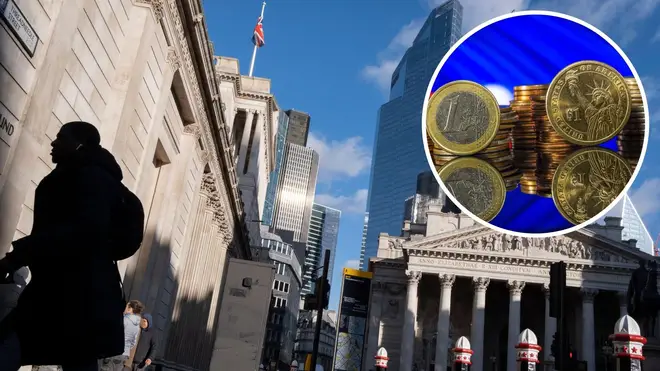
Ben Kentish 10pm - 1am
22 February 2022, 16:49

Over the last few decades, tens, if not hundreds of billions of pounds of Russian money has entered the UK. Much of the money is legitimate, as are the interests of the majority of Russians living and working here.
But a significant proportion of that cash, probably also in the billions of pounds, is suspect. The proceeds of kleptocracy and corruption.
Even quantifying exactly how much is impossible.
It has given rise to the reputation of London in particular as a centre for illicit Russian finance, with nicknames such as "Londongrad" and the "laundromat".
And this is recognised at an official level. In 2020, a joint Home Office and Treasury report noted: "The UK continues to see a significant volume of Russian, or Russian-linked illicit finance channelled through the UK economy".
The report says this money is often invested in "high end UK real estate, private school fees, luxury vehicles, and sometimes as donations to cultural institutions".
London has long been attractive to Russian oligarchs as a financial centre, with a strong housing market, and an internationally trusted legal system.
But the UK has also deliberately encouraged rich Russians into the country, via its "golden visa" scheme - which offered residency to anyone rich enough to invest £2m or more in the country.
The UK issued 2,581 investor visas to Russian citizens from 2008 until the scheme was scrapped just last week.
Anti-corruption charity Transparency International has identified £1.5bn of Russian money in London property, the majority of which it says is held in offshore tax havens.
British Overseas Territories such as the British Virgin Islands are a widely recognised gateway for illicit finance, as exposed in major leaks such as the Panama and Paradise Papers.
Transparency International UK's Director of Policy Duncan Hames said: "This is almost certainly just the tip of the iceberg. Of that £1.5bn, we only know about two thirds from major leaks over the years, or from court documents.
"So there's a great prospect of finding much more of it in the 90,000 property titles in the UK that are owned by companies registered in these secretive places such as the British Virgin Islands."
But as well as personal finance, Russian companies also have a significant footprint on the London Stock Exchange. Largely this is through a practice known as secondary listings, where companies which have their primary listing in one country raise money by re-listing elsewhere.
According to the data company S&P Global, 31 Russian companies are listed on the LSE, with a combined market value of £468bn.
These are often state-owned companies such as oil giant Gazprom or financial services company Sberbank, which form a significant part of the Russian economy, and whose taxes directly finance the Russian State.
They could therefore easily fall within the remit of potential sanctions.
Such deep financial links also come with a personal dimension, as an assessment from the Parliament's Intelligence and Security Committee put it in 2020:
"In brief, Russian influence in the UK is ‘the new normal’, and there are a lot of Russians with very close links to Putin who are well integrated into the UK business and social scene, and accepted because of their wealth.
This level of integration – in ‘Londongrad’ in particular – means that any measures now being taken by the Government are not preventative but rather constitute damage limitation."
And that influence has spread widely. Even into the heart of the British establishment. The same ISC report noted that a number of members of the House of Lords have business interests linked to Russia, and suggested stronger measures should be introduced to scrutinise such links.
Questions have also been raised about the extent of Russian donations to UK political parties, particularly the Conservative Party.
For example, Lubov Chernukhin, the wife of Russian businessman and Putin's former finance minister Vladimir Chernukhin, is the largest female political donor in British history, having given up to £2m to the Conservatives since 2012.
Europe Minister and former Conservative Party Chairman James Cleverly told LBC on Sunday that: "People donate to the Conservative party because they support our aims or objectives.
"Conservative party policy, unlike Labour Party policy, has never been dictated by our political donors."
Today, Boris Johnson announced a series of sanctions on five Russian banks, and three Russian oligarchs. But in the Commons chamber, many MPs argued that these do not go far enough.
Previous attempts at cleaning up the so-called "London laundromat" have also fallen short.
In 2018, the Government introduced Unexplained Wealth Orders to confiscate property where the origins of money couldn't be adequately explained. But thus far, only four UWOs have ever been issued, and of those, only one has so far led to property being confiscated.
In 2016, plans for a "register of beneficial ownership" for UK property was announced, which would identify who ultimately owns and controls a property. But despite it being included in the 2019 Queen's Speech, the Government has still not announced when it plans to bring forward legislation.
In a 2018 report, the House of Commons Foreign Affairs Committee recommended a number of possible strategies, such as cracking down on Russia's ability to issue sovereign debt in UK markets; on the ability of Russian companies and banks to participate in stock market flotations, and by beefing up law enforcement agencies to enable them to tackle the flows of illicit finance.
Should Putin decide upon further incursions into Ukraine, the West has threatened swift, and severe sanctions. It's clear that the UK, and London in particular, has many levers to pull that as yet remain untouched.